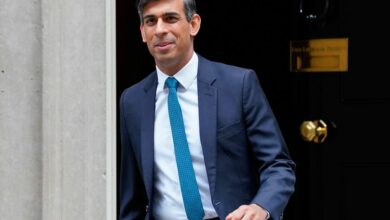Polls Conducted in Russian-Controlled Areas of Ukraine Show Putin’s Party, United Russia, Winning
Russia said on Sunday that municipal elections in four Russian-occupied areas of Ukraine had been won by the United Russia party, which fervently supports President Vladimir Putin.
Despite not having complete military authority over the eastern and southern regions, the Kremlin said last year that it had annexated them. Ukraine and its allies have denounced the elections as a fraud.
State-run news outlets cited data from Moscow and proxy authorities as indicating that United Russia received more than 70% of the vote in each of the war-torn regions where Ukraine is making gains.
Prior to the presidential elections projected to extend Putin’s authority until at least 2030, surveys were also conducted around Russia.
His opponents are either in exile or prison, and Moscow has made criticizing the country’s involvement in Ukraine illegal and imprisoned hundreds of people for doing so.
In the areas of Donetsk, Lugansk, Kherson, and Zaporizhzhia, where Moscow claimed a voting station was struck by a Ukrainian drone, authorities erected mobile polling booths days before the election.
The Kremlin-installed authorities in Donetsk, which has been under rebel control to some extent since 2014, said that Ukrainian bombardment had hurt election officials.
Additionally, voting was going on in Crimea, which Russia invaded in 2014.
Security officials in Ukraine claimed to have a list of “collaborators” involved in the voting’s planning and threatened retaliation.
LIFE IN PEACE
Two voters in Rostov-on-Don, a southwest city on the Ukrainian border that was recently targeted by drones, told AFP that the war was their top concern.
Nina Antonova, 40, said, “We just want to live in peace with our kids.”
“This one issue, the conflict, is causing concern for everyone. We don’t have any more worries,” 84-year-old retiree Anatoli, who wished to remain anonymous, said.
There weren’t many campaign posters in Moscow, where there was also a mayoral election.
A top election official said that incumbent Sergei Sobyanin, a Kremlin supporter born in Siberia and in office since 2010, had won a “convincing” reelection.
Sobyanin has overseen various mega-projects that have changed Moscow’s skyline over his 13 years as mayor of the biggest city in Europe.
Alexei Navalny, an anti-corruption activist, almost beat him in 2013.
In 2020, Navalny was imprisoned on old fraud accusations that, in the opinion of his friends, were only a ruse to terminate his political career after he had rejected the vote from behind bars.
Sobyanin defeated a lesser-known candidate from a brand-new party called “New People” as well as the grandson of a longtime Communist official.
Residents of Moscow have commended Sobyanin for modernizing the city before to the referendum.
Student Rukhin Aliyev, 21, told AFP that “Moscow is blossoming in front of our eyes.”
In especially “in the last year” characterized by the turmoil, musician Kirill Lobanov stated Sobyanin had performed “very well” as mayor.
Sobyanin has downplayed the growing number of drone assaults from Ukraine on Moscow that have damaged the Kremlin and the city’s renowned business sector.
THE HIGH ALERT
Voting was proceeding with increased security measures in bordering areas of Ukraine that have had regular assaults.
Ella Pamfilova, the head of the electoral commission, said that Shebekino, an area of the Belgorod region that has been shelled, had voting postponed “due to a regime of high alert.”
Observers claim that the distant Khakassia region of Siberia, whose governor Valentin Konovalov is running for reelection, has one of the few competitive elections among Russia’s 11 time zones.
After a wave of unusual demonstrations in the sparsely inhabited mountainous area, the 35-year-old Communist beat a Kremlin-backed candidate in 2018.
Sergei Sokol, a candidate supported by Moscow who ran in this year’s election, presented himself as a Kremlin-honored “hero” who fought in Ukraine.
Sokol abruptly withdrew, claiming medical concerns. One of the few regional leaders still in power who is unsupported by the Kremlin is Konovalov.







